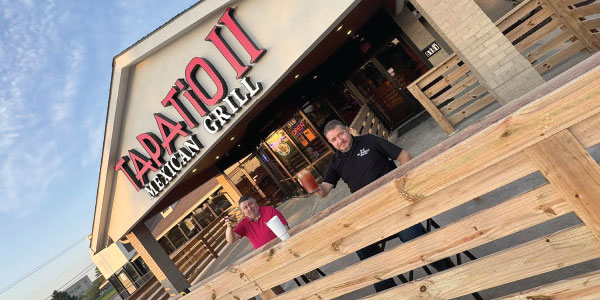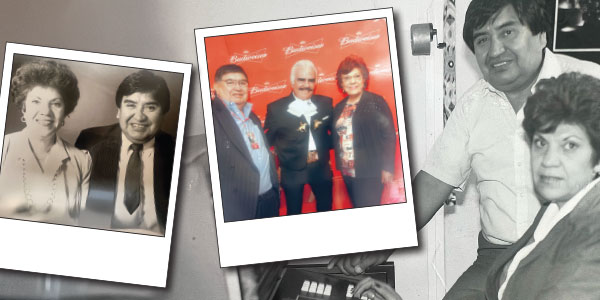
By Jorge Ramos
OFTEN IN “ESSENTIAL” BUT LOW-PAID JOBS, THEY ARE FALLING ILL AND SUFFERING FINANCIALLY AT DISPROPORTIONATELY HIGH RATES.
MIAMI — With decades of effort and dedication, Arturo Morales built a life for himself in the United States. In a matter of days, the coronavirus nearly destroyed it all.
His wife, Besabed Román, died on April 1 of Covid-19. Originally from Mexico, Mr. Morales, 52, has no job and no savings. Tuberculosis, which he suffered from as a young man, left him with only one lung, leaving him particularly vulnerable to the disease. His sole hope is that he won’t become infected as his wife did.
When I spoke to him recently, Mr. Morales, who lives in Chicago, described how his wife became sick. Ms. Román, who had a leg amputated because of diabetes complications, went to a local medical clinic on March 20 for a diabetes checkup. “There, a man was screaming that he had coronavirus,” Mr. Morales told me. “She began to feel ill, like she was short of breath. … The next day, she was really struggling to breathe … and we took her to the hospital, but they didn’t let us in.”
That was the last time Mr. Morales saw his wife. “We said goodbye over the phone,” he said, crying. “They put her on speaker so that she could listen to us.”
The Morales family tragedy — Ms. Román is also survived by the couple’s four daughters and one son — is obviously not unique. But Latinos are disproportionately suffering from the economic and health effects of Covid-19. The pandemic has highlighted the serious health issues that prevail in America’s Latino community — including diabetes, hypertension and obesity — as well as the social inequalities that continue to weigh on Latinos.
The disparity in the extent of the damage caused by the virus is a matter of life and death for Latinos. And yet the Trump administration hasn’t appointed a Spanish-speaking official specifically to address the Latino community during the crisis, nor has it created a Spanish-language website about the virus.
The only thing the government has done for the community is to translate the White House’s guidelines for preventing mass contagion into Spanish — though it did so several days after the release of the English version. Mr. Trump has treated the more than 37 million Spanish speakers in the country as if they don’t exist. Latinos don’t have anyone in the White House, like Dr. Deborah Birx or Dr. Anthony Fauci, to tell them what’s going on in their own language. They are the forgotten. That’s why so many Latinos have been forced to rely on Spanish-language media for their survival.
The situation in New York City is illustrative. There, Latinos represent 34 percent of Covid-19 deaths, according to data released early last month, even though they account for only 29 percent of the city’s population. No other ethnic group has suffered a higher percentage of fatalities.
Latinos have higher contagion risk factors than other groups. Many of them work in sectors that have been considered “essential” during the crisis, including the meat-processing industry, that leave them prone to infection. Latinos make up roughly 23 percent of the agricultural and fishing work force. They put food on our tables.
Yet they have very few protections. In California, the state that produces the most food in the nation, nearly 14 percent of Latinos don’t have health insurance, as is the case for 28 percent of Hispanics and Latinos in the Bronx and 71 percent in Miami. Health insurance is virtually nonexistent among undocumented immigrants in the country.
This is particularly dangerous for a community with an active presence of chronic, and often silent, health conditions like diabetes and hypertension. According to a study from the National Heart, Lung and Blood Institute, 71 percent of Hispanic women and Latinas and 80 percent of Hispanic and Latino men are likely to have at least one cardiovascular disease. And nearly four in 10 Hispanics and Latinos with diabetes were unaware they had it.
The coronavirus pandemic has created a perfect storm for Latino communities. In addition to being more vulnerable to the coronavirus — due to the prevalence of pre-existing medical conditions and relative lack of health insurance — Latinos in the millions now find themselves without jobs or financial resources. Roughly one in three Latino families — 35 percent — have experienced a job loss in the household, according to a Latino Decisions-SOMOS survey.
Recovering from this double crisis won’t be easy — particularly if Latinos don’t receive help from the federal government. The omission of the country’s approximately 10.5 million undocumented immigrants from the nation’s coronavirus aid program was an unbelievable cruelty. Many of these immigrants have children born in the United States. Immigrant farmworkers, who risk their lives every day, are considered “essential” laborers. Yet they are barred from receiving government aid because they don’t have legal documents.
Fortunately, California, which sometimes acts as an anti-Trump haven for migrants, last month announced that approximately 150,000 undocumented immigrants in the state would receive aid totaling $125 million. Each adult is entitled to $500, with a $1,000 maximum per family. “They’re our brothers and sisters. They’re the people who are helping mom and dad,” Gov. Gavin Newsom told me. “Ten percent of our work force is undocumented. Half of our children in California were born to immigrant parents. It’s a matter of great pride for us. They are essential. They are extremely important.”
This program helps the most vulnerable immigrants of all. But the truth is we’re going to need a lot more than good intentions to solve a structural problem that has put the Latino community in extreme danger, medically and economically, amid the pandemic. Aid programs like California’s can have an immediate and positive effect on the Latino community. Sadly, I don’t see similar efforts elsewhere in the country.
The next years won’t be easy. The virus has reversed the progress made in combating unemployment and poverty among Latinos. Families like Mr. Morales’s have lost almost everything.
His wife used to cook the red and green tamales that the couple sold in Chicago to pay the rent and buy food. But after her sudden death, Mr. Morales has been left without a partner and without income.
“Right now, my daughters and many people have supported us,” he told me before saying goodbye, as he breathed with the help of an oxygen tank and wiped away tears. “They have brought us food and a little money too.” Locked in his house, Mr. Morales can only hope the virus spares his life.
_______________________________________________________________________________________
Los olvidados: latinos contagiados, sin empleo, dinero ni ayuda
LA COMUNIDAD LATINA ESTÁ SUFRIENDO DE MANERA DESPROPORCIONADA LOS EFECTOS ECONÓMICOS Y DE SALUD POR LA COVID-19 Y EL GOBIERNO ESTADOUNIDENSE LOS ESTÁ IGNORANDO.
MIAMI — El coronavirus destruyó la vida que el mexicano Arturo Morales armó en Estados Unidos con mucho esfuerzo y dedicación. Su esposa Besabed acaba de morir por la COVID-19. Él no tiene trabajo ni ahorros. Y ahora sólo le queda un pulmón —debido a la tuberculosis que sufrió de joven— y la esperanza de no estar contagiado, como su esposa.
Besabed, quien sufría de diabetes y le había sido amputada una pierna, tenía una cita médica en Chicago. “Ella tuvo una cita en la clínica el día 20 de marzo”, me contó Arturo. “Y ahí andaba un hombre gritando que tenía el coronavirus. Y desde allí […] ella se empezó a sentir mal, como que le faltaba el aire […]. Al otro día le faltaba demasiado el aire […] y la llevamos al hospital, pero ya no nos dejaron entrar”.
Esa fue la última vez que Arturo vio a Besabed. “Nos despedimos por teléfono”, me dijo llorando. “A ella la pusieron en speaker [en el hospital] para que nos escuchara”.
La tragedia de la familia Morales, con cuatro hijas y un hijo, no es única. Los latinos están sufriendo de manera desproporcionada los efectos económicos y de salud por la COVID-19. El coronavirus ha subrayado alguno de los problemas médicos que prevalecen en la comunidad hispana en Estados Unidos —como la diabetes, la hipertensión y la obesidad— y las diferencias sociales respecto a otros grupos de la población.
Aunque la disparidad con que el virus afecta a los latinos es un problema de vida o muerte, el gobierno del presidente Donald Trump ni siquiera ha designado a un portavoz ni ha creado alguna página de internet en nuestro idioma, y sólo tradujo al español, varios días después, la guía de la Casa Blanca para prevenir el contagio masivo. Ha tratado a los más de 37 millones hispanohablantes en el país como si no existieran. No hay nadie que les explique qué pasa, como los doctores Deborah Birx y Anthony Fauci hacen en inglés. Son los olvidados. Por eso tantos hispanos han dependido de los medios de comunicación en español para buscar ayuda y sobrevivir.
El caso de la ciudad de Nueva York es representativo. Ahí, el 34 por ciento de las muertes por el coronavirus corresponden a latinos, a pesar de que sólo son el 29 por ciento de la población. Es el grupo con más fallecimientos.
Los latinos tienen mayores factores de riesgo.
Muchos suelen trabajar en sectores considerados “esenciales” durante esta crisis, como en plantas procesadoras de carne, y por lo tanto han estado más expuestos al virus. Trabajadores e inmigrantes latinos constituyen 23 por ciento de la fuerza laboral en la agricultura y la pesca. Ellos nos dan de comer.
Pero tienen muy pocas protecciones. En California, el estado que más produce alimentos del país, casi el 14 por ciento de los latinos no tienen seguro de salud, al igual que el 28 por ciento de los hispanos en el Bronx y el 71 por ciento en Miami. El seguro médico es casi inexistente entre los indocumentados del país.
Esto es particularmente grave en una comunidad donde están presentes enfermedades silenciosas, como la diabetes y la hipertensión. El 71 por ciento de las latinas y el 80 por ciento de los latinos tienen la probabilidad de sufrir al menos una enfermedad cardiovascular, según un estudio del National Heart, Lung, and Blood Institute. Pero no lo saben. Casi cuatro de cada diez hispanos que fueron diagnosticados con diabetes no tenían ni idea que estaban enfermos.
La pandemia del coronavirus ha sido una tormenta perfecta para las comunidades hispanas. Además de estar más expuestos al coronavirus —por padecer condiciones médicas preexistentes y carecer, en muchos casos, de un seguro médico—, esta crisis ha dejado a millones de latinos sin trabajo y sin dinero. Una de cada tres familias latinas (el 35 por ciento) reportó que al menos uno de sus miembros perdió su empleo por el coronavirus, según una encuesta de Latino Decisions-SOMOS.
Recuperarse de esta doble crisis no será fácil. Particularmente si no se recibe ayuda del gobierno federal. Es incomprensible y cruel que Trump no haya incluido a los aproximadamente 10 millones de indocumentados en su programa de ayuda. Muchos de ellos tienen hijos estadounidenses nacidos en este país. Es irónico que los trabajadores del campo sean considerados “esenciales” para enfrentar esta crisis y que todos los días se jueguen la vida. Pero, a la hora de repartir la ayuda, quedaron fuera por no tener documentos legales.
Afortunadamente, California, que a veces es una especie de isla antitrumpeana, ha decidido ayudar a unos 150.000 indocumentados con un fondo de 125 millones de dólares. Cada uno podrá recibir 500 dólares (y un máximo de mil dólares por familia). “Son nuestros hermanos y hermanas; son las personas que están ayudando a papá y mamá”, me dijo el gobernador Gavin Newsom. “El 10 por ciento de nuestra fuerza laboral está indocumentada. La mitad de nuestros niños en California nacieron de padres inmigrantes. Es un asunto de gran orgullo para nosotros. Son esenciales. Son importantísimos”.
Este es un programa que ayuda a los más vulnerables de los vulnerables. Se necesita mucho más que buenas intenciones para resolver un problema estructural que ha puesto a los hispanos en Estados Unidos en un altísimo riesgo médico y económico debido al coronavirus. Programas como el de California pueden tener un efecto inmediato y positivo en la comunidad latina. Pero no veo esfuerzos similares en el resto del país.
Los próximos años no serán fáciles. Los avances logrados en los últimos años contra el desempleo y la pobreza entre los latinos han retrocedido en los meses de pandemia. Familias, como la de Arturo Morales, han perdido casi todo.
Su esposa Besabed cocinaba los tamales, rojos y verdes, que vendían juntos en Chicago para pagar la renta y comer. Pero, tras su repentina muerte, Arturo se ha quedado sin pareja y sin ingresos. “Ahorita mis hijas y mucha gente nos han apoyado. Nos han traído comida y un poco de dinero también”, me contó antes de despedirse, mientras respiraba con la ayuda de un tanque de oxígeno y se limpiaba las lágrimas. Encerrado en su casa, sólo espera que el virus no lo ataque a él.










